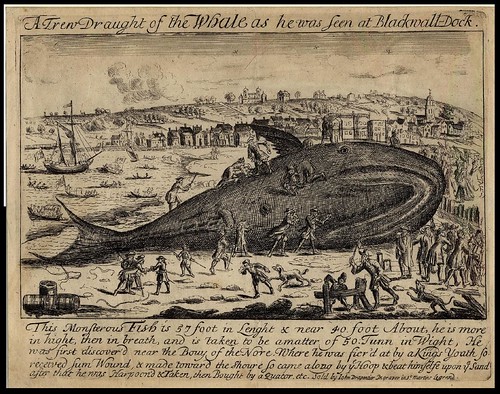Article first published as Book Review: Galore by Michael Crummey on Blogcritics.
Michael Crummey's Galore is a magical roundelay of stories and characters, historical and fantastical. It opens with a mysterious man found in the belly of a whale, and goes full-speed from there, sketching the harsh life to be had from trying to make a living from the sea. Life and death viscerally cycles round and round, with echoes biblical and poetic through the rest of the book.
The novel is set in a wild, cold Newfoundland, where it never seems to be summer, the temperature always cold and wet, with snow on the ground, a fireplace burning, ice on the water nearby. The book also seems out of time, as the tales told wind through multiple generations of two families, the Sellers and the Devines.
Their stories aren't anchored in any century until the last third of the book, and the reader may be disappointed to find real events encroaching on this fabulous fairytale. The kaleidoscopic nature of Galore may be best encapsulated by this passage, " 'Now the once,' she said. It was the oddest expression he'd learned on the shore. Now the once. The present twined with the past to mean soon, a bit later, some unspecified point in the future. As if it was all the same finally, as if time was a single moment endlessly circling on itself."
The way people talk, both in local dialect and Irish-inflected, gives the book a unique flavor. Galore is constructed of many anecdotes and tall tales, told out of sequence. The overall effect is as if you were at someone's family dinner table listening to old family scandals which grow more and more outlandish as the wine flows throughout the evening.
And as there are multiple characters with multiple points of view, there are also multiple ways to tell the same story, “It was called the French cemetery, King-me told him, because the first people buried there were sailors drowned when a French ship wrecked on the Tolt a hundred years before. Or because the land once belonged to a man named French who buried a wife and child during a typhoid outbreak before he was cut down himself. Sellers seemed to have no idea which story was the true source of the name and no obvious preference for one over the other.”
Canadian poet and novelist Crummey cites One Hundred Years of Solitude by Gabriel Garcia Marquez as an influence, and Galore is definitely a distant cousin of that classic of magical realism. But there was something about Galore that drew me in a little more deeply than Marquez and his characters, the Buendías. The characters of Galore are numerous and so deftly and economically drawn, one would think that it would be hard to connect with any one individual, but there are stand-outs, who manage to draw you in and enchant you and wish for more — Bride, Dr. Newman, and Abel quickly became favorite characters. It's a book one would pick up again, to get reacquainted with old friends.
The author spent time compiling folktales and interviewing Newfoundlanders to find inspiration for the family sagas which incorporate superstitions, both religious and supernatural, that are depicted in Galore. "Every Newfoundland outport has at least one story of a dead man sitting up in his coffin during the wake or at the funeral. Usually it’s offered up as simple fact, with a ‘can you believe that’ shake of the head. ... In the isolated rural and oral culture of outport Newfoundland, the line between life and death, between the real and the otherworldly, is more porous than most of us are used to. And that makes all kinds of outlandish notions seem perfectly likely. Ghosts and fairies, spells and charms and curses, prayers and folk cures."
Galore also focuses on the religious and the profane, taking delight in contrasting the struggles of the shore inhabitants, feuding English Protestants and Irish Catholics, dealing with their pride and baser natures. Possibly the basest nature of them all belongs to one of the more memorable characters, the defrocked priest, Father Phelan, " 'It’s like in the Book of Job,' Jabez suggested to Father Phelan. 'God sends trials to test us.' 'God is a miserable bastard,' the priest said."
The word galore derives from the Irish go leòr meaning enough, plenty. It seems a perfect, yet contradictory word to describe this wonderful book and its memorable characters. A circle within a circle. And I'm looking forward to reading it again, now the once.
Book #11 in reading challenge Cannonball Read 3, sponsored by Pajiba



0 comments:
Post a Comment